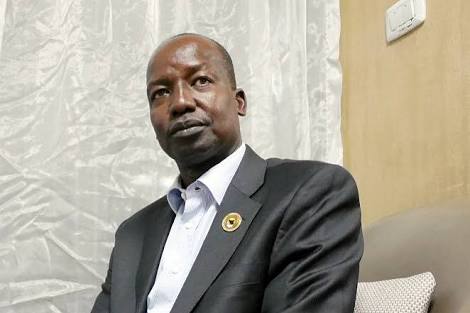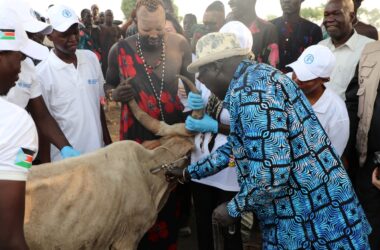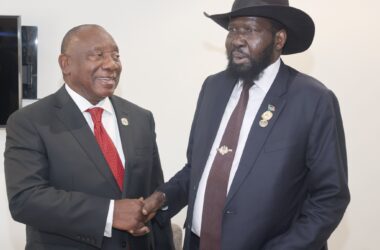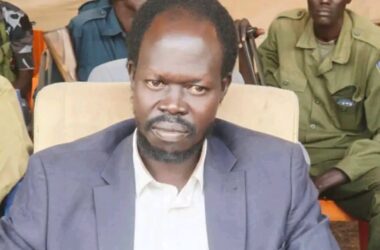
By Kiden Stela Mandela
The National Salvation Front NAS, one of the hold out groups who are not signatory to the Revitalized Agreement on Resolution of Conflict in South Sudan (R-ARCSS), has stated that it will not join the peace process.
NAS was responding to a statement made by the Governor of Central Equatoria State, Emmanuel Adil on Monday 3rd August, after a meeting he held with leaders of the Episcopal Church of South Sudan, Internal Province of Central Equatoria State.
In a story published on No. 1 Citizen Daily Newspaper on Tuesday 4th August, Governor Emmanuel Adil was quoted as saying the National Salvation Front [NAS], headed by Thomas Cirilo, was a challenge to the state, and in order for the conflict to end, dialogue had to be pursued.
“There are challenges in our State my leaders in Christ. This challenge is related to security because of the presence of the National Salvation Front. The NAS signed the Khartoum Cessation of Hostilities Agreement (COHA)…. which when we went to Rome, they said we would not sign a new one since we signed a document called Rome declaration, because they respected the Khartoum COHA which binds all of us. In that context, cessation of hostilities means stop fighting, don’t move forces wherever you are, disengage, so that is the meaning,” said Adil.
Governor Adil was speaking at his Office in Juba while addressing the delegation of Bishops of Episcopal Church of South Sudan (ECSS), headed by Archbishop Paul Pitia Yugusuk of the Episcopal Internal Province of Central Equatoria.
“And all of a sudden things became different with greater Lainya, generally speaking for us to end these ongoing conflict we have to pursue the National Salvation [to] join the process as a long term solution. Let us pursue dialogue, the people of Mukaya were displaced twice this is the third and fourth [times], really the same people look at the trauma they have been exposed [to] and then things continue like that,” Adil added.
In response, the Spokesperson of the National Salvation Front, Suba Samuel Manase told No. 1 Citizen Daily Newspaper in an exclusive interview by phone that the statement uttered by the Governor was not in place, stating that NAS did not have problems with the government of Central Equatoria State as long as the decentralization system was concerned in South Sudan. He said the State Government was supposed to deliver services to the citizens at the counties through the local governments.
“The function of the Government of the State does not include pursuing the peace with the nationals that have problems with the national government, so I think that statement is out of place, and the person who is responsible for this doesn’t know the dynamics of politics in the country. So what we know is that we have problems with the Government of Salva Kiir, and if there is any negotiation, it has to be between the government of Kiir and the National Salvation Front. The government is responsible for social development of the nation, and to the state level,” Suba argued.
“If he is able to address the problems within Central Equatoria, what about our forces who are operating in Jonglei and Western Bahr-el-Gazal? Which means the statement is not in place because we have forces in Pibor and Upper Nile,” the NAS spokes-person explained.
Suba further claimed that the Revitalized Peace Agreement was the root cause of continued violence in South Sudan and that it did not address the problems of South Sudan.
“Unless the people of South Sudan come out with a document that will unify all the political needs, then the country will not be in peace, but for now we are not part of that peace, we have the commitment and that is the reason why we came with the national force to bring total peace together to the people of South Sudan, not this peace that people have over talked about. South Sudan needs peace that means freedom, democracy, development and justice, but not peace that the country is personalized and all the time gunshot,” Suba claimed.
Suba denied that NAS was responsible for the destabilization of the areas such as; Yei, Mukaya, Lobonok, Morobo, the citizens of which he said are still moving in their thousands to refugee camps around the world, claiming that this movement was caused by the government and the opposition forces, and not the NAS. He alleged that the violence and human rights abuses in these areas were committed by the government and opposition forces.
NAS went on to accuse the government of having not carried out any development in South Sudan delivered since it came to power in 2005, despite the oil money. Suba said as long as Salva Kiir’s government was still in power, NAS would not be part of the peace agreement.
When contacted by No.1 Citizen Daily Newspaper, Maj. Gen. Lul Ruai Kong, the Spokesperson of South Sudan People’s Defense Forces (SSPDF) said, “how do we cause the displacement of Civilians in even some areas that do not have our presence. It is the NAS. NAS has been fighting the SPLA-IO, they have been fighting us, and you could remember even the other day in Gorom area, near the gold Mining area, they came and attacked us in the process where they killed two members of the same family,” Maj. Gen. Lul Ruai explained.
“They are the ones who are abducting people who are going about their own businesses in the country side, they are ambushing vehicles in all the roads. So if civilians were being displaced, if they are being killed, then we are not the ones. Where NAS does not have presence, we do not have problems with civilians, they are the ones who normally hide themselves in populated areas, so what NAS Spokesperson told you is a big lie,” Maj. Gen. Lul Ruai reiterated.
Meanwhile, the Presidential Press Secretary Ateny Wek Ateny told No.1 Citizen Daily Newspaper on 10th August, in a phone interview, “well, I was thinking that Thomas Cirilo was part of the hold out groups which are actually part of the peace negotiation in Rome and they have arrived to a certain level with our negotiating team. There was no condition that Thomas Cirilo plays on the issue of President Kiir being the President. If he is waiting for President Kiir not to be the President, then he is not looking for peace, because President is the President of the Republic in this transition period until the time when people go for elections. He will go for elections, if elected then he will continue as President,” Ateny explained.
“Thomas Cirilo cannot give conditions that if President Kiir is still the leader he will not negotiate, then he is looking for war,” Ateny added.



